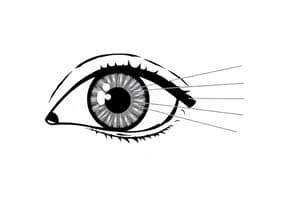Podcast
Questions and Answers
What is the primary sensory organ responsible for smell?
What is the primary sensory organ responsible for smell?
- Ear
- Eye
- Tongue
- Nose (correct)
What triggers nerve impulses in the olfactory system?
What triggers nerve impulses in the olfactory system?
- Sound vibrations
- Electrical signals
- Light waves
- Airborne chemicals (correct)
How is taste perception influenced?
How is taste perception influenced?
- By smell and texture (correct)
- By texture and sound
- By temperature and sound
- By sound alone
What can cause a loss of smell?
What can cause a loss of smell?
What happens to sensory receptors over time with constant stimulation?
What happens to sensory receptors over time with constant stimulation?
What is the primary function of rods in the human eye?
What is the primary function of rods in the human eye?
Which part of the ear is responsible for amplifying sound waves?
Which part of the ear is responsible for amplifying sound waves?
What type of hearing loss involves damage to the hair cells or auditory nerve?
What type of hearing loss involves damage to the hair cells or auditory nerve?
Which structure in the vestibular system detects rotational movements of the head?
Which structure in the vestibular system detects rotational movements of the head?
Which of the following is NOT a sense detected by taste buds?
Which of the following is NOT a sense detected by taste buds?
Flashcards
Special Senses
Special Senses
Specialized sensory systems detecting light, sound, chemicals, and body position, distinct from general senses.
Vision
Vision
Sensing light; the eye converts light into signals the brain interprets.
Hearing: Outer Ear
Hearing: Outer Ear
Part of the ear collecting sound waves, like a funnel.
Taste
Taste
Signup and view all the flashcards
Equilibrium
Equilibrium
Signup and view all the flashcards
Taste Pathway
Taste Pathway
Signup and view all the flashcards
Smell and Taste Connection
Smell and Taste Connection
Signup and view all the flashcards
Olfactory Receptors
Olfactory Receptors
Signup and view all the flashcards
Sensory Adaptation
Sensory Adaptation
Signup and view all the flashcards
Stimulus Intensity Coding
Stimulus Intensity Coding
Signup and view all the flashcards
Study Notes
Overview of Special Senses
- Special senses are highly specialized sensory systems, responsible for detecting specific stimuli, like light, sound, chemicals, and body position.
- They are distinct from general senses, which detect temperature, pain, touch, and pressure.
- The special senses include vision, hearing, equilibrium, taste, and smell.
- Each special sense has a distinct receptor organ and pathway to the brain.
Vision
- The eye is the sensory organ for vision.
- Components of the eye include the cornea, lens, retina, and optic nerve.
- Light entering the eye is focused by the cornea and lens onto the retina, where photoreceptor cells (rods and cones) convert light into neural signals.
- Rods are responsible for black and white vision in low light conditions.
- Cones are responsible for color vision in bright light.
- The optic nerve transmits these signals to the brain for interpretation.
- Common vision problems include myopia (nearsightedness), hyperopia (farsightedness), and astigmatism.
Hearing
- The ear is the sensory organ for hearing and equilibrium.
- The outer ear (pinna and auditory canal) collects sound waves.
- The middle ear (malleus, incus, and stapes) amplifies and transmits vibrations to the inner ear.
- The inner ear contains the cochlea (a fluid-filled, spiral-shaped structure) and its associated hair cells.
- Vibration of fluid within the cochlea causes hair cell deflection, generating nerve impulses that are sent to the brain through the auditory nerve.
- Hearing loss can stem from damage to any part of the auditory pathway.
- Conduction hearing loss interferes with sound conduction to the inner ear.
- Sensorineural hearing loss involves damage to the hair cells or auditory nerve.
Equilibrium
- Equilibrium refers to the sense of balance and spatial orientation.
- The vestibular system in the inner ear, which consists of semicircular canals and otolith organs, monitors head position and movement.
- Semicircular canals detect rotational movements.
- Otolith organs detect linear acceleration and head position.
- Information from the vestibular system is sent to the brain via the vestibular nerve.
- Imbalance can result from damage to the vestibular system.
Taste
- The tongue is the sensory organ for taste.
- Taste buds contain specialized receptor cells (gustatory cells).
- Different taste receptor cells respond to different taste stimuli (sweet, sour, salty, bitter, and umami).
- Taste information is relayed to the brain through cranial nerves.
- Taste perception is influenced by smell and texture.
Smell (Olfaction)
- The nose is the sensory organ for smell.
- Olfactory receptors in the olfactory epithelium detect airborne chemicals (odorants).
- Stimulation of olfactory receptors triggers nerve impulses that are carried to the brain via the olfactory nerves.
- Olfaction is strongly linked to memory and emotion.
- Loss of smell can be caused by nasal congestion, damage to the olfactory nerves, or other medical conditions.
General Considerations of Special Senses
- All special senses experience adaptation over time.
- Sensory receptors become less sensitive to a constant stimulus.
- The intensity of a stimulus is encoded by the frequency of action potentials and the number of activated receptors.
Studying That Suits You
Use AI to generate personalized quizzes and flashcards to suit your learning preferences.




